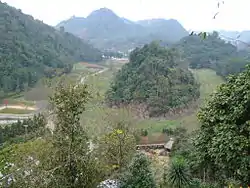Doi Ang Khang
Doi Ang Khang (Thai: ดอยอ่างขาง) is a mountain in Fang District, Chiang Mai Province, Thailand. It is part of the Daen Lao Range that straddles both sides of the Burmese-Thai border. It is the site of an agricultural station, the first research station set up by King Bhumibol Adulyadej in 1969.[1] The peak of Doi Ang Khang is 1,928 metres (6,325 ft) above sea level, and the agricultural station covers an area of 1,989 rai (318 ha).
| Doi Ang Khang | |
|---|---|
 Doi Ang Khang park | |
| Highest point | |
| Elevation | 1,400 m (4,600 ft) |
| Coordinates | 19°54′1.2″N 99°2′21.5″E |
| Geography | |
 Doi Ang Khang Thailand | |
| Location | Ban Khum Village, Mu 5, Mae Ngon Sub district, Amphoe Fang, Chiang Mai Province |
| Parent range | Daen Lao Range |
| Geology | |
| Mountain type | Limestone |
| Climbing | |
| Easiest route | drive |
Climate
The temperature average is 17.7 °C. The highest temperatures range from 35-38 °C in April. The lowest temperature recorded is -3 °C in January. The rainfall average is 2,075 mm per year.
| Climate data for Doi Ang Khang (1981–2010) | |||||||||||||
|---|---|---|---|---|---|---|---|---|---|---|---|---|---|
| Month | Jan | Feb | Mar | Apr | May | Jun | Jul | Aug | Sep | Oct | Nov | Dec | Year |
| Average high °C (°F) | 20.0 (68.0) |
23.0 (73.4) |
26.2 (79.2) |
27.4 (81.3) |
24.3 (75.7) |
24.0 (75.2) |
22.9 (73.2) |
22.4 (72.3) |
22.6 (72.7) |
21.6 (70.9) |
19.8 (67.6) |
18.7 (65.7) |
22.7 (72.9) |
| Average low °C (°F) | 13.0 (55.4) |
15.0 (59.0) |
17.5 (63.5) |
18.6 (65.5) |
17.6 (63.7) |
17.8 (64.0) |
17.7 (63.9) |
17.7 (63.9) |
17.5 (63.5) |
16.8 (62.2) |
14.3 (57.7) |
12.6 (54.7) |
16.3 (61.3) |
| Average relative humidity (%) | 64 | 47 | 46 | 59 | 80 | 85 | 88 | 91 | 88 | 88 | 77 | 73 | 74 |
| Mean monthly sunshine hours | 272.8 | 240.1 | 275.9 | 243.0 | 198.4 | 159.0 | 161.2 | 158.1 | 183.0 | 198.4 | 249.0 | 251.1 | 2,590 |
| Mean daily sunshine hours | 8.8 | 8.5 | 8.9 | 8.1 | 6.4 | 5.3 | 5.2 | 5.1 | 6.1 | 6.4 | 8.3 | 8.1 | 7.1 |
| Source: Office of Water Management and Hydrology, Royal Irrigation Department[2] | |||||||||||||
Ang Khang Royal Agricultural Station
The agricultural station researches and cultivates temperate climate fruits, flowers, and vegetables. At present, the station has more than 12 species of temperate fruits such as raspberries, peaches, plums, kiwis, and strawberries, and more than 60 species of vegetables such as carrots, Brussels sprouts, and peas, and more than 50 species of temperate flowers such as carnations and roses.
Gallery


 Fang Valley from one of the two access roads to Doi Ang Khang
Fang Valley from one of the two access roads to Doi Ang Khang Ang Khang Royal Agricultural Station
Ang Khang Royal Agricultural Station
References
- Dawson, Alan (24 December 2017). "Living the high life". Bangkok Post. Retrieved 24 December 2017.
- "ปริมาณการใช้น้ำของพืชอ้างอิงโดยวิธีของ Penman Monteith (Reference Crop Evapotranspiration by Penman Monteith)" (PDF) (in Thai). Office of Water Management and Hydrology, Royal Irrigation Department. p. 15. Retrieved 31 July 2016.
External links
| Wikimedia Commons has media related to Doi Ang Khang. |
 Doi Ang Khang travel guide from Wikivoyage
Doi Ang Khang travel guide from Wikivoyage- Tourism Authority of Thailand: Doi Angkhang